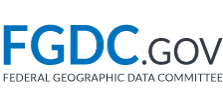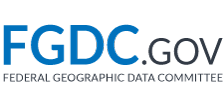The Open GIS Consortium, Inc. (OGC) is a not-for-profit industry consortium dedicated to "geoprocessing interoperability." OGC runs a consensus process in which most of the world's geoprocessing software vendors as well as integrators, universities, and government agencies agree on open, standard software interfaces that enable interoperation between geoprocessing systems from different vendors and of different kinds (GIS, remote sensing, automated mapping and facilities management, etc.). Communicating through agreed upon interfaces, dissimilar systems will access each other's data and processing functions over the Internet and other networks.
The data sharing paradigm thus will move away from mailing or ftp'ing entire data files, and geodata and geoprocessing will become part of everyone's information environment. For example: It will be possible to put data online and have that data be immediately available to anyone as a thematic layer in their GIS; a query you make across the network will return a query result, not a data layer to be queried using your computer's software; you might not have a GIS on your computer, but your browser might download GIS "applets" and geodata to enable you to perform a spatial analysis; and our mobile "Internet appliances" will express for us our needs and our coordinates, and online services will tell us how to get where we are going and to find what we are looking for.
The OpenGIS Simple Features Specification is the first part of the specification to have been completed. Vendors have written conformant products which they are now submitting to OGC for conformance testing. "Simple Features" addresses basic points, lines, and polygons, along with attributes and spatial referencing. The next specifications will deal with catalogs, coverages (which includes imagery, raster processing, TINs, etc.), and more complete handling of the issues addressed in the OpenGIS Simple Features Specification.
The relationship between OGC and FGDC has grown closer and both groups work closely with ISO TC 211, the international standards group concerned with geoprocessing and geodata. John Moeller of the FGDC sits on OGC's Management Committee, and the FGDC has become active in OGC's Technical Committee. In particular, Doug Nebert of FGDC has played an important role recently in writing, with industry partners, one of the two responses to OGC's OpenGIS Catalog Request for Proposals (RFP). The OpenGIS Catalog Specification will be an enabling technology for the NSDI Clearinghouse, a "catalog of catalogs."
The NSDI develops through a co-evolution of products and practices. In the new world of interoperable geoprocessing, metadata standards and data content standards will continue to be necessary, and will in fact become more important as commerce in geodata grows and as data becomes more abundant. It's true that metadata tasks will be aided by tools that will make it easier to develop conformant data. And other tools will automatically filter through metadata on hundreds of sites to help users find the best possible data for a particular purpose, even when the metadata are not entirely conformant or consistent. But these tools will augment, not replace data coordination.
In OGC's "Domain Special Interest Groups (SIGs)" experts in geoprocessing application areas reach consensus on the domain-specific geoprocessing functions that need standard interfaces. That is, these SIGs extend the OpenGIS Specification so that it meets the special needs of domains such as transportation, telco operations, defense and intelligence, and disaster management. To the extent that users in these NSDI domains can benefit from interoperability, they have a stake in the SIGs' success, and thus they have a reason to participate.
OGC is a prime example of the "network effect" that industry philosophers talk about, in which the system's value to everyone increases with the number of people who are connected. OGC seeks broad participation in its consensus process, and invites NSDI stakeholders to participate in whatever way possible.

